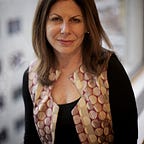Women & Girls: Building the 21st Century Workforce
Changing the Status Quo for Women and Girls Worldwide
By Karen Sherman, President of The Akilah Institute and the author of the forthcoming book, Brick by Brick: Building Hope and Opportunity for Women Survivors Everywhere
By 2022, 65 percent of today’s children will hold jobs that do not yet exist. Globalization, urbanization, and migration are transforming the jobs of the future. How can girls and women in particular adapt to these realities — and not risk falling further behind in their education and economic participation?
This was one of the questions posed at a recent symposium on education, skills and employment held in Washington, DC, co-sponsored by the Akilah Institute, alongside powerhouse institutions including: Brookings Institution, the International Center for Research on Women, theInternational Labor Organization, UNICEF and the United Nations Girls Education Initiative.
The top issue: how best to prepare girls and young women for the 21st-century workforce and the implications for their formal and informal education.
33% of Young Women are NEAT: Not in Education and Training
Even with persistent gender data gaps, it’s clear that in many parts of the world, girls’ enrollment and completion at the secondary school level remains a major challenge — one third of all females are not participating in any kind of education, employment or training program. Poverty, cultural norms, early marriage and pregnancy all affect participation in education. Women and girls also continue to provide most of the unpaid care and domestic labor globally, which impacts their ability to stay in school and engage in paid work.
Three different panels of experts convened to look at these and other challenges. They recommended a collaborative effort among stakeholders: governments, policy makers, private sector leaders, development practitioners, and educators. At the heart of the matter: poor quality education and access issues must be addressed. Governments, it was suggested, should devise social policies built around educational incentives to get and keep girls in school. Incentives were touted as one strategy. Convincing parents that their daughters are worth educating was another. “When parents are aware of the benefits of education and skills-building, they are more likely to promote it,” said Maria Brindlmayer from Making Cents.
Schooling, however, is only a piece of the puzzle. Gender and skills gaps will likely be exacerbated by digital technologies and the changing nature of work.
In and out of school, what are the priority skills for girls to learn?
How do we ensure the skills we offer in education and training programs are the most relevant? The majority of companies and development service providers are grappling with this very issue, according to Mekala Krishnan from the McKinsey Global Institute, which will be releasing a report next month on the future of work for girls and women. “We typically focus on technical skills, but we also need higher cognitive, as well as socio-emotional skills,” she said. “We need to build a mindset around continued learning.”
The Akilah Institute, Rwanda’s only women’s college, concurs and has placed so-called soft skills such as critical thinking, creativity, and collaboration at the center of its academic model. “The distinctions between hard and soft skills are more blurry now, said Dr. Cristi Ford from Akilah. “[At many traditional institutions], students are not being taught to think critically, and faculty are not trained to instill those skills. This pedagogical failure is everywhere.”
Work and learn
Some in the private sector, like Blackboard, are not waiting for educational systems to catch up. Instead they are actively working to close access and skills gaps by enhancing opportunities for training, reskilling, and continuing education. “Our motto is: ‘Hire friendly, train technically,’” said Niki Zoli from Marriott International, one of the largest hotel chains in the world. One in ten jobs worldwide is tied to travel and tourism, and Marriott has consciously prioritized women’s leadership in their hiring, training, and promotional practices.
Akilah supports a transition to competency-based evaluation rather than knowledge- focused — what you can do vs. what you know — to better prepare today’s youth for future careers.
The future of work
What else sets the 21st century workforce apart from the 20th century workforce? Around 1985, 40 percent of the competing workforce was women — today it is less than 25%. Girls Who Code is trying to address that statistic along with a significant digital gender divide through its emphasis on the three C’s: capabilities in computer science, careers in technology, and community (building communities of support). “We teach women to ‘be brave, not perfect,’” said Ryan Clarke from the organization, which is expanding its program internationally due to intense interest across all grade levels.
The path to success is not linear
“We often hear about the gig economy, but not gig learning. Pathways to work these days are not linear,” said UNICEF’s Gemma Wilson-Clark. To make progress, “we need to develop flexible and accreditable pathways for women to combine earning with learning.“ Caroline Worsham from Entangled Solutions agrees. She spoke of learner- workers and the need to create flexible systems and language to match a changing world.
Technology doesn’t just “happen” to us
While it’s clear that automation and new technologies may disrupt jobs, increase existing skill gaps and create new ones that could potentially leave even more women and girls behind, there is still plenty of opportunity the panelists concluded. “Technology is not a force that we can do nothing about,” offered Krishnan from McKinsey:
